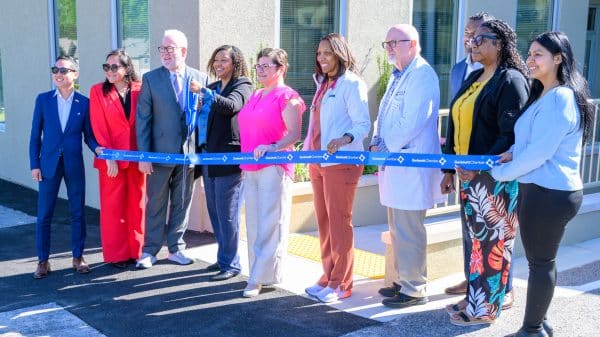At the Southwest Gwinnett Chamber of Commerce’s First Friday Breakfast, Keith Jennings, vice president of community impact at Jackson Healthcare, noticed a commonality among the members in the room—dedication.
“I know for a fact, you’re not here in this room today because I’m here. You’re here [to show] your dedication to this chamber and its mission and the great work you are doing in this community,” he said. “I hope something I share today connects with you, maybe even bothers you to the extent that you try some new generosity tactics.”
As the country’s third-largest healthcare staffing firm and the seventh-largest private company in metro Atlanta, Jackson Healthcare has a corporate philosophy of serving the greater good.
That’s why its culture goes beyond healthcare staffing search and technology. Its mission and corporate values of “others first” as well as “wisdom and growth” serve as a “true north,” according to the organization’s corporate literature.
More than giving back
In his presentation, Jennings set out to reframe the definition of generosity. Utilizing the phrase “giving back” isn’t wrong, he said, but it doesn’t fully encompass what generosity is.
“We all use this phrase now. [I’d been] using it in my role all the time. And then I started not liking the phrase,” Jennings said. “Then I struck it from my language and thought … I’m not going to say, ‘giving back’ when it comes to what professionals and businesses do.”
When dissecting the phrase, he said, “It comes out of a scarcity mindset.”
“[The phrase] ‘giving back’ means first you receive. Then, when you have enough, maybe you give back. The words also sit in the future, like giving back is something we’ll do one day when we’ve made it or when we feel successful enough to give back,” he explained.
He added that most human beings in this world are living paycheck to paycheck.
“They’re just trying to survive today. The idea of having a margin that they can give back is not even an option for them,” he said. “This is really what started bothering me. I started thinking a little—what’s the word?”
He knew there must be a more significant concept than just giving back. It turned out to be generosity.
What does generosity truly mean?
“Generosity comes out of an abundance mindset. We can be generous anytime, with anyone. It’s not something you have to wait for,” said Jennings.
“When we feel successful or feel like we’re not, we can be generous. … And it’s inclusive. The most generous human beings I’ve ever met have far less than I do. And yet, they were extraordinarily generous people,” he added.
The different types of generosity
“The first level of generosity is kindness,” said Jennings. “Hold the door open for someone, smile, look in someone’s eyes and listen.”
He described the glass elevators at Jackson Healthcare. People in the elevator have to look at others, make eye contact and wave. Additionally, all the microwaves are on the first floors of its buildings, so people have opportunities to engage in conversation.
“We’ve designed elements of our campus to foster conversation and communication, going back to this idea of trying to give people collision points for kindness,” he explained.
“Giving is what we tend to think of when we think of generosity—giving our time, giving money, giving advice, giving out experiences and what we have to offer to others,” he said.
“But advocacy is also a type of generosity—being a voice for people without a voice or standing in solidarity,” he added.
How does being generous affect us?
Jennings mentioned an article in Psychology Today that examined the neurochemical drivers of doing generous acts. Biological reactions involving dopamine, serotonin, oxytocin and dopamine stimulate the brain’s pleasure centers and send messages.
“Dopamine is activated in fight or flight scenarios, real or imagined. Serotonin is related to mood and many other things. Oxytocin is called the cuddle hormone. It’s our sense of bonding and trust in our relationships,” Jennings said.
“Scientists have found that when we help another person in any way, we get a triple boost of oxytocin, serotonin and dopamine. They call this the ‘happiness trifecta,’” he elaborated.
When this happens repeatedly, over time, it has immense mental and physical health benefits, he added, citing research done through Notre Dame’s Templeton Foundation.
Learning more about generosity
Jennings concluded his presentation by inviting everyone to join a movement that is championed by more than 1,500 companies throughout the state.
GoBeyondProfit focuses on the collective level of generosity in workplaces. Founded in 2017 and fully funded by Jackson Healthcare, the initiative is open to all and is entirely free.
“We just want business leaders to share their ideas and get together and have a community together. If you want to become a member, just go to the website and sign the form,” said Jennings.
“When we think of corporate generosity or philanthropy, we think of it as businesses going out into the communities. But we tend not to think that should start internally,” he added.
For more information about the work Jennings is doing, visit jacksonhealthcare.com and gobeyondprofit.org/research.













